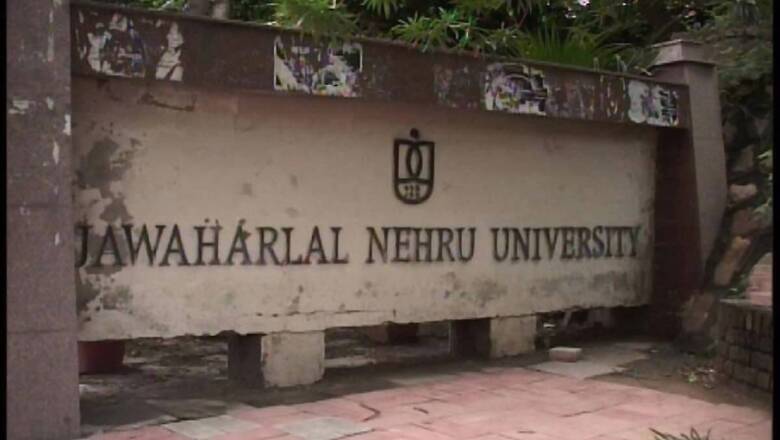
views
New Delhi: The Jawaharlal Nehru University Teachers Association (JNUTA) has written to the Ministry of Social Justice and Empowerment and to the Ministry of Education, raising concerns about the varsity’s interpretation of reservation policy which violates the “backlog reserved vacancy” rule in the SC/ST category. This is leading to de-reservation of the SC/ST reserved seats in the faculty recruitment.
The teachers had first raised this issue with the Ministry of Education on March 6 but no action was taken.
The aggrieved parties then filed a petition in the Delhi High Court with Ministry of Education as the respondent. The JNU teachers are concerned the varsity must not set the precedent for violation of reservations or misinterpretation of the policy.
In the letter, JNUTA has urged the central government to step in for the preservation of policy in faculty recruitment.
‘Gross Violation of Backlog Rule’
According to a DoPT document on ‘reservation for SCs/STs and OBCs, 2016’, reserved and backlog reserved vacancies are those that are earmarked reserved for that category in an earlier recruitment year, but remain unfilled in the previous recruitment attempt due to non-availability of suitable candidates from that category, and still remain unfilled.
As per the DoPT brochure, which is followed by the institutes, there is a ceiling of 50% reservation on filling of reserved vacancies. It would apply only to those vacancies that arise in the current year. The backlog reserved vacancies of SCs, STs and OBCs — in case of direct recruitment and backlog reserved vacancies of SCs and STs in case of promotion of earlier years —are treated as a separate and distinct entity.
The backlog reserved vacancies would not be considered together with the reserved vacancies of the year in which they are filled for determining the ceiling of 50% reservation on the total number of vacancies of that year.
The JNUTA informed the government that a scrutiny of two advertisements issued by JNU for recruitment of faculty in the Professor and Associate Professor cadres in 2019 brought to light “gross violation of the reservation policy”.
“A number of posts that had been advertised in earlier years as being reserved for SC and ST categories but had remained unfilled, were converted into unreserved posts or their reservation categories had been changed,” said the letter signed by JNUTA VP Ajmer Singh Kajal and Secretary Surajit Mazumdar.
Pointing out another important aspect, the teachers’ association said the move amounted to de-reservation of posts and not mere reallocation of reservation among the vacant posts. “De-reservation was clear from the fact that the total number of posts reserved for SC and ST candidates in these two cadres had been reduced by over 30,” it said.
The reduction by over 30 in these two cadres has further implications of lack of representation. “One implication was that the number of sanctioned posts occupied or assigned to these two categories would fall below that required by the prescribed reservation percentages (15 and 7.5 per cent respectively),” the teachers highlighted in the letter.
The only way this could happen, 13 years after this reservation was implemented by the UGC through its 2006 Guidelines (and effectively implemented in JNU from 2011), was “if the JNU had violated the backlog rule while recasting the rosters in 2019 after the introduction of new reservations.”
Other mentions in the letter are that of 2016 and 2107 advertisements issued by the JNU as part of a special recruitment drive for SCs and STs, detailing how the number of posts shown as reserved for SC and ST categories has dropped to 57.
The issue was raised in the JNU Executive Council by elected teacher representatives, but as per the JNUTA letter, the administration brushed the issue aside, refusing to offer any explanation and accepting that an error had indeed been made.
‘JNU Rewriting Country’s Reservation Policy’
In the letter, the JNUTA told government that in order to justify its position of violating the backlog vacancy rule for SC/ST, the varsity is redefining the term ‘backlog vacancy’.
The teachers said that as per JNU, a post which has been advertised as reserved for SC or ST candidates does not become a backlog post unless “the interviews for the post were actually held and the Selection Committee found no candidate suitable for appointment.”
This implies that the law provides a regressive device to a person in authority to de-reserve a post and “this objective of de-reservation can be achieved by just not holding interviews for that post,” JNUTA said.
What teachers have tried to highlight is that JNU is effectively admitting to de-reserving the posts, which “did not meet this ingeniously restrictive definition of a backlog vacancy.” However, even the backlog vacancies identified in this manner “are not to be found in the 2019 roster created after recasting.”
The strongly worded letter further says, “The JNU administration has now taken recourse to something that is beyond its authority, namely a rewriting of the country’s reservation law with retrospective effect, to defend its indefensible violations of such law.”
Violation of Backlog Vacancy Rule Justified Citing ‘OBC Reservation’
In another attempt to justify their stand on backlog vacancy, the administration has defies all logic as it talks about accommodation of the OBC reservation.
It also limits the number of current vacancies from 50% to 22.5 % before 2019 as there was no OBC reservation in these cadres at that time. By putting forth these arguments, the JNU is making the case for ‘excess reservations.’
According to JNUTA, the administration is trying another argument — of accommodation. “According to the administration, once OBC reservations were introduced in 2019 in the Associate Professor and Professors cadres, the number of SC and ST positions had to be reduced to ‘accommodate’ these new reservations.”
This explanation by JNU also defies all logic as “these are separate reservations and assigned distinct points in the 200-point roster,” said JNUTA.
“What JNU is calling ‘accommodation’ is, in fact, the result of the failure to separate the SC/ST backlog vacancies from other vacancies,” teachers write to the government.
Onus on Liaison Officer
The administration is also seeking to simultaneously exonerate anyone occupying any position of administrative authority between 2011 and 2019 for what it has now declared to be ‘excess’ reservation in the past, as per the complaint by teachers.
They are putting the onus on the liaison officer.
As per the 2006 UGC guidelines, a liaison officer is “responsible for monitoring the implementation of reservations under these guidelines”.
According to JNU’s reading of this, however, the liaison officer has the “exclusive power and responsibility to prepare the roster and is therefore solely responsible for any misallocation of roster points.”
But this interpretation has legal limitations and can fall flat as detailed further in the complaint letter to the Centre.
The JNU Registrar Pramod Kumar said the matter is sub-judice and the university will abide by the court’s verdict.




















Comments
0 comment